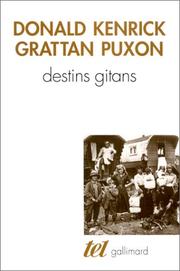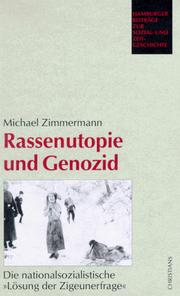| Listing 1 - 10 of 26 | << page >> |
Sort by
|
Book
ISBN: 9287190658 Year: 2021 Publisher: Namur : Council of Europe,
Abstract | Keywords | Export | Availability | Bookmark
 Loading...
Loading...Choose an application
- Reference Manager
- EndNote
- RefWorks (Direct export to RefWorks)
This manual, edited by Ellie Keen under the direction of Rui Gomes, serves as an educational resource for teaching young people about the genocide of the Roma. It aims to strengthen Roma identity and promote human rights through the education of history and memory. The manual provides educational activities, detailed instructions, and historical context, emphasizing the importance of understanding history to combat racism and uphold dignity and justice. It is primarily intended for educators, NGOs, and youth organizations.
Book
ISBN: 2811122990 Year: 2014 Publisher: Paris (22-24, Bd Arago 75013) : Éditions Karthala,
Abstract | Keywords | Export | Availability | Bookmark
 Loading...
Loading...Choose an application
- Reference Manager
- EndNote
- RefWorks (Direct export to RefWorks)
« Roms », « Tsiganes », « Nomades » : autant de mots équivoques par lesquels se reconduisent des malentendus qui se sont montrés meurtriers dans l'histoire. Au cours des XIXe et XXe siècles, sous l'effet de décisions politiques et d'institutions savantes, des classifications désignant des groupes « exotiques » jugés inaptes à la vie sociale ont fait de ceux-ci un problème. Sous le nom de « question rom », ce problème est devenu celui d'une vaste « minorité » à traiter à l'échelle européenne alors qu'un nouvel antitsiganisme se répand dans « l'Europe ouverte ». Le malentendu s'aggrave. Cet ouvrage dresse un état présent des connaissances sur le sort des Tsiganes en Europe pendant la Seconde Guerre mondiale, sujet passé sous silence alors que d'importants travaux ont renouvelé les perspectives. On y passe ensuite au crible les catégories et représentations mobilisées à propos de cet « autre », afin de comprendre les ressorts sociaux, politiques et culturels de cette haine collective de moins en moins ambivalente, et les contradictions qu'elle révèle sur l'Europe comme système de valeurs et « civilisation ». Sciences humaines, droit, littératures, art, philologie et philosophie sont interrogés pour penser autrement les relations entre mondes tsiganes et non tsiganes, et la singularité des formes de vie. Ce livre est issu du colloque international Tsiganes, Nomades : un malentendu européen, qui s'est tenu à Paris et à Pau en octobre et novembre 2011. Il comprend trente-quatre contributions de disciplines différentes. Catherine Coquio est professeur de littérature comparée à l'Université Denis-Diderot (Paris 7, Cerilac), elle travaille sur les modes d'inscription et d'effacement de la violence historique et la teneur politique de l'art. Jean-Luc Poueyto est anthropologue du monde manouche, spécialiste de l'illettrisme et des relations entre écrit et oral ; membre de l'ITEM, il enseigne à l'Université de Pau.
Romanies --- Romani Genocide, 1939-1945 --- Intellectual life
Book
ISBN: 2251380647 9782251380643 Year: 2003 Volume: 59 Publisher: Paris: Les Belles Lettres,
Abstract | Keywords | Export | Availability | Bookmark
 Loading...
Loading...Choose an application
- Reference Manager
- EndNote
- RefWorks (Direct export to RefWorks)
Romanies --- Tsiganes --- Nazi persecution --- Persécutions nazies --- Persécutions nazies --- Romani Genocide, 1939-1945.
Book
ISBN: 9782811111236 2811111239 Year: 2014 Publisher: Paris : Karthala,
Abstract | Keywords | Export | Availability | Bookmark
 Loading...
Loading...Choose an application
- Reference Manager
- EndNote
- RefWorks (Direct export to RefWorks)
Romanies --- Romanies --- Romani Genocide, 1939-1945. --- Tsiganes --- Tsiganes --- Tsiganes --- Intellectual life --- Vie intellectuelle --- Persécutions nazies
Book
ISBN: 0857458434 Year: 2013 Volume: v. 17 Publisher: New York : Berghahn Books,
Abstract | Keywords | Export | Availability | Bookmark
 Loading...
Loading...Choose an application
- Reference Manager
- EndNote
- RefWorks (Direct export to RefWorks)
Using the framework of genocide, this volume analyzes the patterns of persecution of the Roma in Nazi-dominated Europe. Detailed case studies of France, Austria, Romania, Croatia, Ukraine, and Russia generate a critical mass of evidence that indicates criminal intent on the part of the Nazi regime to destroy the Roma as a distinct group. Other chapters examine the failure of the West German State to deliver justice, the Romani collective memory of the genocide, and the current political and historical debates. As this revealing volume shows, however inconsistent or geographically limited, ove
Romani Genocide, 1939-1945 --- World War, 1939-1945 --- Romanies --- Atrocities --- History --- Germany --- Ethnic relations
Book
ISBN: 9780993389825 Year: 2016 Publisher: Marshwood, Dorset : Lamorna Publications,
Abstract | Keywords | Export | Availability | Bookmark
 Loading...
Loading...Choose an application
- Reference Manager
- EndNote
- RefWorks (Direct export to RefWorks)
Book
ISBN: 9780691244044 Year: 2023 Publisher: Princeton : Princeton University Press,
Abstract | Keywords | Export | Availability | Bookmark
 Loading...
Loading...Choose an application
- Reference Manager
- EndNote
- RefWorks (Direct export to RefWorks)
"A major new history of the genocide of Roma and Jews during World War II and their entangled quest for historical justiceJews and Roma died side by side in the Holocaust, yet the world did not recognize their destruction equally. In the years and decades following the war, the Jewish experience of genocide increasingly occupied the attention of legal experts, scholars, educators, curators, and politicians, while the genocide of Europe's Roma went largely ignored. Rain of Ash is the untold story of how Roma turned to Jewish institutions, funding sources, and professional networks as they sought to gain recognition and compensation for their wartime suffering.Ari Joskowicz vividly describes the experiences of Hitler's forgotten victims and charts the evolving postwar relationship between Roma and Jews over the course of nearly a century. During the Nazi era, Jews and Roma shared little in common besides their simultaneous persecution. Yet the decades of entwined struggles for recognition have deepened Romani-Jewish relations, which now center not only on commemorations of past genocides but also contemporary debates about antiracism and Zionism.Unforgettably moving and sweeping in scope, Rain of Ash is a revelatory account of the unequal yet necessary entanglement of Jewish and Romani quests for historical justice and self-representation that challenges us to radically rethink the way we remember the Holocaust"--
Romani Genocide, 1939-1945. --- World War, 1939-1945 --- Holocaust, Jewish (1939-1945) --- Romanies --- Romani Genocide, 1939-1945 --- HISTORY / Modern / 20th Century / Holocaust --- POLITICAL SCIENCE / Genocide & War Crimes --- Atrocities. --- Nazi persecution --- Historiography. --- Historiography.

ISBN: 2070735508 9782070735501 Year: 1995 Volume: 254 Publisher: Paris: Gallimard,
Abstract | Keywords | Export | Availability | Bookmark
 Loading...
Loading...Choose an application
- Reference Manager
- EndNote
- RefWorks (Direct export to RefWorks)
Persécutions nazies --- Persécutions nazies --- Romanies --- Tsiganes --- History --- Nazi persecution --- Histoire --- Romani Genocide, 1939-1945. --- Gypsies --- Europe

ISBN: 3767212706 Year: 1996 Volume: 33 Publisher: Hamburg : Christians,
Abstract | Keywords | Export | Availability | Bookmark
 Loading...
Loading...Choose an application
- Reference Manager
- EndNote
- RefWorks (Direct export to RefWorks)
Romani Genocide, 1939-1945. --- World War, 1939-1945 --- Tsiganes --- 2ème guerre mondiale --- Atrocities --- Persécutions nazies --- Atrocités
Book
ISBN: 2738100635 9782738100634 Year: 1989 Publisher: Paris jacob
Abstract | Keywords | Export | Availability | Bookmark
 Loading...
Loading...Choose an application
- Reference Manager
- EndNote
- RefWorks (Direct export to RefWorks)
Euthanasia --- Holocaust, Jewish (1939-1945) --- World War, 1939-1945 --- Euthanasie --- Holocauste, 1939-1945 --- 2ème guerre mondiale --- History --- Gypsies --- Histoire --- Tziganes --- Romanies --- 2ème guerre mondiale --- Nazi persecution. --- Atrocities --- Science and state --- Germany --- 20th century --- Genocide --- Human experimentation in medicine --- Romani Genocide, 1939-1945.
| Listing 1 - 10 of 26 | << page >> |
Sort by
|

 Search
Search Feedback
Feedback About UniCat
About UniCat  Help
Help News
News